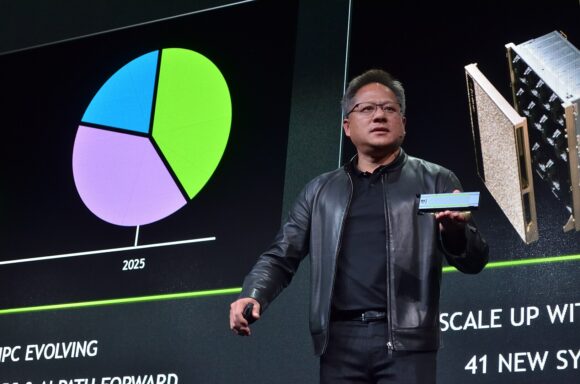Nvidia CEO Jensen Huang has confirmed that the company has received approval from former U.S. President Donald Trump’s administration to sell its advanced H20 computer chips to China, marking a significant development in the ongoing battle over technology access and global AI leadership.
The announcement was made late Monday in a blog post on Nvidia’s official website, and Huang elaborated on the approval during an interview on China’s state-run CGTN television network, with the remarks later shared on the social media platform X.
“The U.S. government has assured Nvidia that licenses will be granted, and Nvidia hopes to start deliveries soon,” the company said in the blog post. Speaking to reporters in Beijing, Huang added, “Today, I’m announcing that the U.S. government has approved for us filing licenses to start shipping H20s.”
Huang emphasized the significance of the Chinese market in global AI development. “It’s so innovative and dynamic here in China that it’s really important that American companies are able to compete and serve the market here,” he said, noting that nearly half of the world’s AI researchers are based in China.
The Nvidia chief is currently in Beijing to attend the China International Supply Chain Expo, where the company is also exhibiting. During his visit, he met with Ren Hongbin, chairman of the China Council for the Promotion of International Trade, which is hosting the event. Huang’s visit follows recent meetings with Trump and other U.S. policymakers as part of ongoing efforts to address concerns around AI chip exports.
Nvidia has benefited immensely from the global surge in AI adoption, recently becoming the first company to surpass a $4 trillion market valuation. Despite this growth, U.S.-China trade tensions have weighed heavily on the industry. Washington has imposed a series of escalating restrictions on the export of advanced technologies to China, citing national security risks and the potential for dual-use applications in military development.
In January, ahead of Trump’s return to office, the Biden administration unveiled a new framework aimed at regulating the export of high-performance chips used in AI development. The strategy sought to strike a balance between safeguarding national security and supporting U.S. tech sector competitiveness.
Then, in April, the White House announced new limits on the sale of Nvidia’s H20 chips and AMD’s MI308 chips to China. These restrictions prompted Nvidia to forecast an estimated $5.5 billion financial hit, triggering a campaign by Huang and other tech leaders to persuade U.S. policymakers—particularly Trump—to roll back the measures.
Industry executives have warned that overly strict export controls risk undercutting U.S. companies’ competitiveness in a key sector while potentially driving foreign partners toward China’s rapidly developing AI ecosystem.
Following Monday’s announcement, Nvidia shares dipped by 0.5 percent in after-hours U.S. trading. However, investor sentiment appeared more positive in Europe, with the company’s Frankfurt-listed shares climbing 3.2 percent early Tuesday.
As tensions persist between economic and national security interests, Nvidia’s move highlights the delicate balance the U.S. must strike in maintaining its technological edge while engaging with one of its largest markets.






